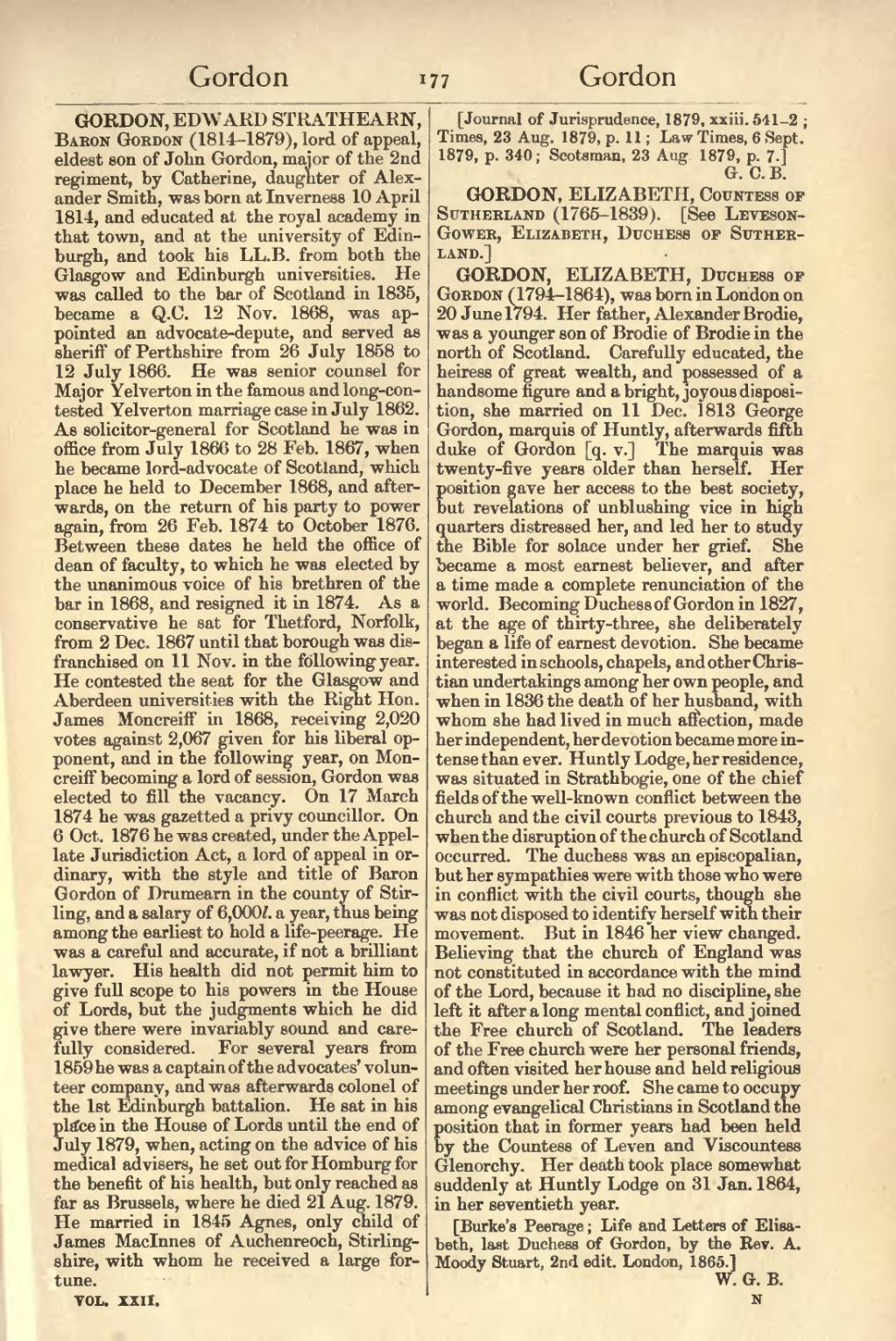GORDON, EDWARD STRATHEARN, Baron Gordon (1814–1879), lord of appeal, eldest son of John Gordon, major of the 2nd regiment, by Catherine, daughter of Alexander Smith; was born at Inverness 10 April 1814, and educated at the royal academy in that town, and at the university of Edinburgh, and took his LL.B. from both the Glasgow and Edinburgh universities. He was called to the bar of Scotland in 1835, became a Q.C. 12 Nov. 1868, was appointed an advocate-depute, and served as sheriff of Perthshire from 26 July 1858 to 12 July 1866. He was senior counsel for Major Yelverton in the famous and long-contested Yelverton marriage case in July 1862. As solicitor-general for Scotland he was in office from July 1866 to 28 Feb. 1867, when he became lord-advocate of Scotland, which place he held to December 1868, and afterwards, on the return of his party to power again, from 26 Feb. 1874 to October 1876. Between these dates he held the office of dean of faculty, to which he was elected by the unanimous voice of his brethren of the bar in 1868, and resigned it in 1874. As a conservative he sat for Thetford, Norfolk, from 2 Dec. 1867 until that borough was disfranchised on 11 Nov. in the following year. He contested the seat for the Glasgow and Aberdeen universities with the Right Hon. James Moncreiff in 1868, receiving 2,020 votes against 2,067 given for his liberal opponent, and in the following year, on Moncreiff becoming a lord of session, Gordon was elected to fill the vacancy. On 17 March 1874 he was gazetted a privy councillor. On 6 Oct. 1876 he was created, under the Appellate Jurisdiction Act, a lord of appeal in ordinary, with the style and title of Baron Gordon of Drumearn in the county of Stirling, and a salary of 6,000l. a year, thus being among the earliest to hold a life-peerage. He was a careful and accurate, if not a brilliant lawyer. His health did not permit him to give full scope to his powers in the House of Lords, but the judgments which he did give there were invariably sound and carefully considered. For several years from 1859 he was a captain of the advocates' volunteer company, and was afterwards colonel of the 1st Edinburgh battalion. He sat in his place in the House of Lords until the end of July 1879, when, acting on the advice of his medical advisers, he set out for Homburg for the benefit of his health, but only reached as far as Brussels, where he died 21 Aug. 1879. He married in 1845 Agnes, only child of James MacInnes of Auchenreoch, Stirlingshire, with whom he received a large fortune.
[Journal of Jurisprudence, 1879, xxiii. 541-2; Times, 23 Aug. 1879, p. 11; Law Times, 6 Sept. 1879, p. 340; Scotsman, 23 Aug. 1879, p. 7.]
GORDON, ELIZABETH, Countess of Sutherland (1765–1839). [See Leveson-Gower, Elizabeth, Duchess of Sutherland.][1]
GORDON, ELIZABETH, Duchess of Gordon (1794–1864), was born in London on 20 June 1794. Her father, Alexander Brodie, was a younger son of Brodie of Brodie in the north of Scotland. Carefully educated, the heiress of great wealth, and possessed of a handsome figure and a bright, joyous disposition, she married on 11 Dec. 1813 George Gordon, marquis of Huntly, afterwards fifth duke of Gordon [q. v.] The marquis was twenty-five years older than herself. Her position gave her access to the best society, but revelations of unblushing vice in high quarters distressed her, and led her to study the Bible for solace under her grief. She became a most earnest believer, and after a time made a complete renunciation of the world. Becoming Duchess of Gordon in 1827, at the age of thirty-three, she deliberately began a life of earnest devotion. She became interested in schools, chapels, and other Christian undertakings among her own people, and when in 1836 the death of her husband, with whom she had lived in much affection, made her independent, her devotion became more intense than ever. Huntly Lodge, her residence, was situated in Strathbogie, one of the chief fields of the well-known conflict between the church and the civil courts previous to 1843, when the disruption of the church of Scotland occurred. The duchess was an episcopalian, but her sympathies were with those who were in conflict with the civil courts, though she was not disposed to identify herself with their movement. But in 1846 her view changed. Believing that the church of England was not constituted in accordance with the mind of the Lord, because it had no discipline, she left it after a long mental conflict, and joined the Free church of Scotland. The leaders of the Free church were her personal friends, and often visited her house and held religious meetings under her roof. She came to occupy among evangelical Christians in Scotland the position that in former years had been held the Countess of Leven and Viscountess Glenorchy. Her death took place somewhat suddenly at Huntly Lodge on 31 Jan. 1864, in her seventieth year.
[Burke's Peerage; Life and Letters of Elisabeth, last Duchess of Gordon, by the Rev. A. Moody Stuart, 2nd edit. London, 1865.]
- ↑ No such entry exists in volume 33 between the entries Leveson, Richard and Leveson-Gower, Francis. While there is a modern biography for this lady in the ONDB, the ONDB does not incorporate an article from the DNB—which is done when one exists (Elizabeth Leveson-Gower (1765–1839), DOI 10.1093/ref:odnb/42000.. (Wikisource contributor note)
